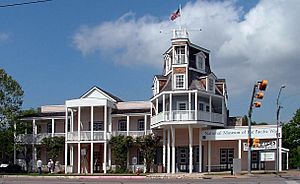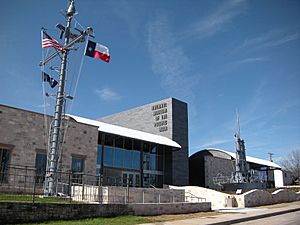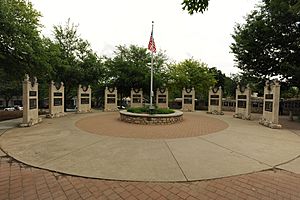National Museum of the Pacific War facts for kids
 |
|
 |
|
| Lua error in Module:Location_map at line 420: attempt to index field 'wikibase' (a nil value). | |
| Established | February 24, 1969 |
|---|---|
| Location | 340 East Austin Street Fredericksburg, Texas United States |
| Type | Maritime museum |
The National Museum of the Pacific War is a special place in Fredericksburg, Texas. It tells the amazing story of the Pacific War during World War II. This museum is located in the hometown of Fleet Admiral Chester W. Nimitz. He was a very important leader during the war. Admiral Nimitz was the commander of the United States Pacific Fleet. He also led all the forces in the Pacific Ocean areas.
The museum covers six acres and has several parts. One main part is the Admiral Nimitz Gallery. This gallery is inside the old Nimitz Hotel. It shares Admiral Nimitz's life story, from his childhood to his naval career. It also shows how the old hotel changed over time.
Contents
The Nimitz Hotel's History
The Nimitz Hotel was built by Charles Henry Nimitz in 1852. Charles was Admiral Nimitz's grandfather. He was a German sailor who came to the United States in 1844. He moved to Fredericksburg in 1846 with the first settlers. Charles Nimitz married Sophie Dorothea Mueller. They had many children.
Locals called the hotel the "Steamboat Hotel." This was because its front looked like the bow of a ship. The hotel had a saloon, a brewery, and a ballroom. The ballroom was also used as a theater. Many famous people stayed there. These guests included President Rutherford B. Hayes and General Ulysses S. Grant.
Admiral Chester Nimitz was born on February 24, 1885. His father died before he was born. His grandfather, Charles, was like a father to him for his first five years. When Chester was a teenager, he was accepted into the United States Naval Academy. He graduated as one of the top students. Chester Nimitz became a very important leader in the U.S. Navy. He was Commander-in-Chief of the U.S. Pacific Forces in World War II. Fleet Admiral Nimitz passed away on February 20, 1966. The Nimitz Hotel became a recognized historical marker in 1989.
Exploring the Museum
The Admiral Nimitz Foundation started in 1964. Its goal was to create a museum honoring Admiral Nimitz. The old Nimitz Hotel was restored. It became the Admiral Nimitz Museum in 1968. At first, the museum focused only on Admiral Nimitz.
In 2000, the museum changed its name. It became the Admiral Nimitz State Historic Site – National Museum of the Pacific War. Now, it focuses on all the battles of World War II in the Pacific. At the main entrance, you can see parts of the USS Pintado (SS-387) submarine. This includes its conning tower.
The Pacific Combat Zone
The Pacific Combat Zone is a special area. It looks like a Pacific island battlefield. You can see a Quonset Hut, a PT boat, and a Japanese tank. There are also palm trees and machine gun spots. The museum holds "Living History" events here. During these events, people re-enact battles. The Quonset Hut now also hosts the museum's STEAM Lab. This lab offers fun science, technology, engineering, art, and math activities.
Japanese Garden of Peace
On May 8, 1976, the Japanese government gave the museum a special gift. It was the Japanese Garden of Peace. This garden was designed by Taketora Saita. It is a copy of a private garden in Japan. This original garden belonged to Admiral Tōgō. Admiral Nimitz admired Admiral Tōgō. He even helped create a memorial for the Japanese admiral.
Plaza of the Presidents
The outdoor Plaza of the Presidents opened on September 2, 1995. This date was the 50th anniversary of the end of World War II. On that day, Admiral Nimitz accepted Japan's surrender. The plaza honors ten U.S. Presidents who served during World War II. These presidents include Franklin D. Roosevelt and Harry S. Truman. It also includes Dwight D. Eisenhower, John F. Kennedy, and George H. W. Bush.
George H.W. Bush Gallery
The George H.W. Bush Gallery opened in 1991. Former President George H.W. Bush cut the ribbon for this gallery. It cost $3 million to build. Inside, you can see a Japanese midget submarine. This submarine was part of the attack on Pearl Harbor. There is also a Japanese "Rex" floatplane and an American North American B-25 Mitchell bomber. The museum is also home to the PT boat PT-309.
On December 7, 2009, the museum held a grand re-opening for the expanded George H.W. Bush Gallery. Former President George H.W. Bush and his wife Barbara attended. Texas Governor Rick Perry was also there. Many survivors of the Attack on Pearl Harbor came to the ceremony. The second floor of this gallery now has the Nimitz Education and Research Center.
See also
- Imperial War Museum – London, England
- Marine Corps War Memorial – Arlington County, Virginia
- Museum of the War of Chinese People's Resistance Against Japanese Aggression – Beijing, China
- Museum of The History of Ukraine in World War II – Kyiv, Ukraine
- Museum of World War II – Natick, Massachusetts (Closed in September 2019)
- Museum of the Great Patriotic War – Poklonnaya Gora, Moscow, Russia
- Museum of the Second World War – Gdańsk, Poland
- National D-Day Memorial – Bedford, Virginia
- National World War I Museum – Kansas City, Missouri
- National World War II Memorial – National Mall, Washington, DC
- United States Holocaust Memorial Museum – National Mall, Washington, DC
- American Heritage Museum – Stow, Massachusetts
- The National WWII Museum – New Orleans, Louisiana
- List of museums in Central Texas
- List of Texas state historic sites
- List of maritime museums in the United States
 | Misty Copeland |
 | Raven Wilkinson |
 | Debra Austin |
 | Aesha Ash |



